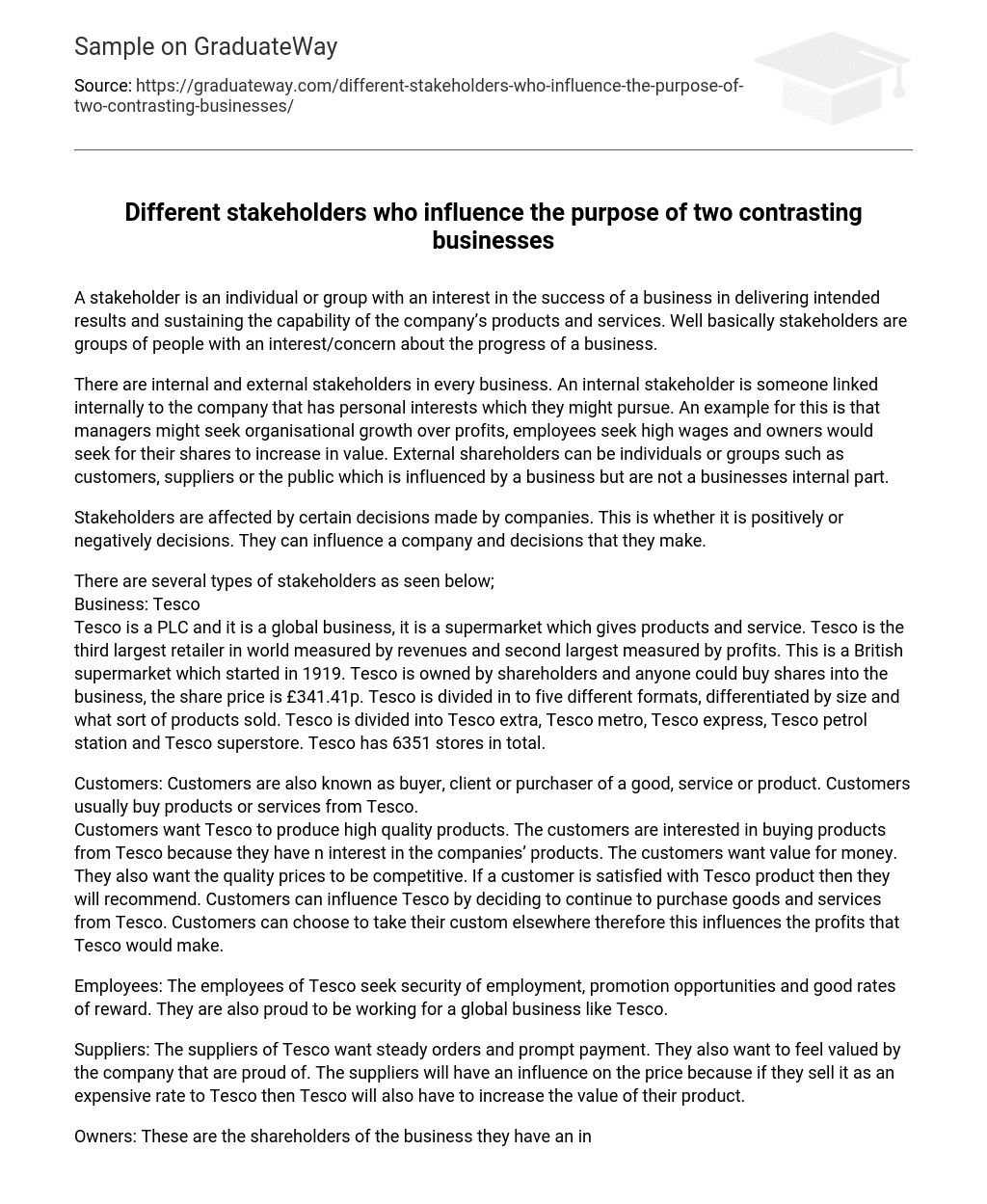Stakeholders are individuals or groups who have a vested interest in the success of a business, including its ability to deliver desired outcomes and maintain products and services. These people can be described as those who have interests or concerns about the company’s development.
Both internal and external stakeholders exist within every business. Internal stakeholders are individuals within the company who possess their own personal interests. For instance, managers may prioritize organizational growth rather than profits, employees may desire higher wages, and owners may strive to enhance the value of their shares. Conversely, external stakeholders can consist of individuals or groups such as customers, suppliers, or the public who are impacted by the business but do not have direct involvement in its internal operations.
The decisions made by a company can have both positive and negative impacts on stakeholders, which can subsequently influence the company’s future decision-making.
Below are the various stakeholders:
Business: Tesco
Tesco, a global business and PLC, is a supermarket that provides products and services. It holds the position of being the third largest retailer in terms of revenues and the second largest in terms of profits worldwide. This British supermarket was established in 1919. Tesco is owned by shareholders who can buy shares in the business at a share price of £341.41p.
Tesco has five different formats: Tesco extra, Tesco metro, Tesco express, Tesco petrol station, and Tesco superstore. These formats vary in size and product offerings. Overall, there are 6351 stores operated by Tesco.
Customers, also known as buyers, clients, or purchasers, are individuals who actively seek and make purchases of goods, services, or products. They generally prefer Tesco as their preferred choice for buying.
Customers seek high-quality products from Tesco and are attracted to the company because of their interest in its offerings. They expect to receive value for their money and competitive prices. If customers are satisfied with Tesco’s products, they will recommend them to others. By consistently supporting Tesco by purchasing goods and services from them, customers have the ability to influence the success of the company. Conversely, they can choose to take their business elsewhere, which would impact Tesco’s profits.
Employees of Tesco highly prioritize job security, promotion opportunities, and competitive rewards. They also take pride in being a part of a global corporation like Tesco.
Suppliers of Tesco’s have two primary objectives: receiving consistent orders and timely payment, while also desiring acknowledgement and appreciation from the company. Additionally, these suppliers hold the power to impact prices. Selling their products to Tesco at a higher rate would consequently necessitate an increase in the value of Tesco’s own product.
The presence of shareholders in Tesco is crucial because of its global business nature. Shareholders, who are the owners, have a vested interest in the company’s profits and are considered as primary stakeholders. They dedicate significant time to the company, motivated by their desire for profit increase and business value growth. Monitoring Tesco’s performance and reputation closely, shareholders hold influence over decision-making, which can be positive through additional investments or negative by withdrawing funds.
The presence of businesses has a significant and transformative impact on both local and national communities. Community leaders have a crucial role in representing the concerns and interests of important groups within the community.
Governments strive to have prosperous businesses that generate employment opportunities and enhance tax revenues, while simultaneously prioritizing the welfare of society.
It is important for businesses to prioritize meeting the needs of all stakeholder groups, considering their interconnectedness.
Organization: RSPCA
The RSPCA is made up of internal stakeholders who are dedicated to the welfare of unloved and unwanted pets. The charity was established by its founders, and the Board of Trustees plays a crucial role in managing and making decisions for the organization.
Donators play a vital role in the success of Rspca by providing essential financial support that allows the organization to thrive as a charity. They are major stakeholders who not only contribute funds but also hold significant influence over Rspca’s operations. Without the generous donations from this group, Rspca’s work would be hindered and the animals they care for might not receive adequate treatment. Donators prioritize the cause rather than the donation amount and understand that their contributions make a positive impact.
The RSPCA is dedicated to aiding animals that are sick or incapable of fulfilling their fundamental requirements, such as providing them with appropriate food, water, and shelter. Additionally, they attend to any illnesses the animals may have.
Customers are individuals who entrust Rspca with animals they no longer can care for. Reasons for this include personal frustration with the pet or the presence of a medical condition that the owner cannot afford to treat. This concerns the customer since it assures that the pet will receive improved and secure care. Furthermore, the customer will no longer need to be concerned about the well-being of the pet, as Rspca will ensure its proper management. Additionally, customers have the option to seek assistance from Rspca regarding veterinary expenses and rescue operations.
Employees are important stakeholders in Rspca because they rely on the organization for income. In non-profit organizations, volunteering is seen as a generous act. Employees usually seek job security, advancement opportunities, fair pay, and the opportunity to impact endangered animals’ lives.
Managers at Rspca have the responsibility of establishing connections and resolving customer concerns. They also supervise the day-to-day activities to guarantee prompt assistance is given to animals requiring immediate attention.
The Trade Union, also referred to as the people advocating for improved working conditions, are dedicated to ensuring a favorable work environment for the Rspca staff.
Both Tesco and the Rspca have distinct stakeholders due to their different management styles. Consequently, these stakeholders consistently prioritize the best interests of either the customer or the company.





